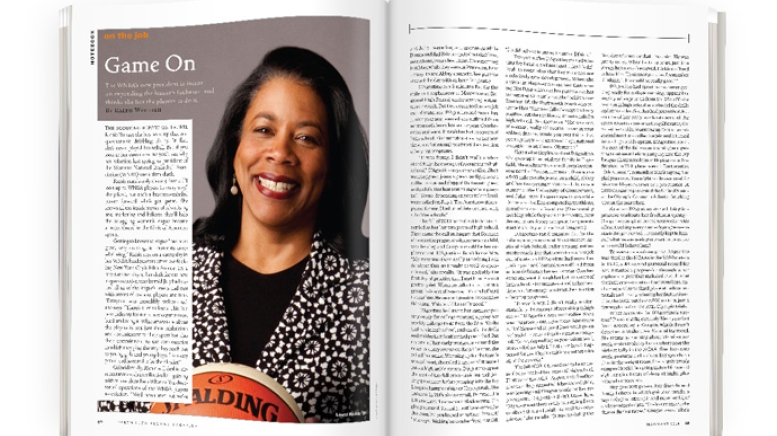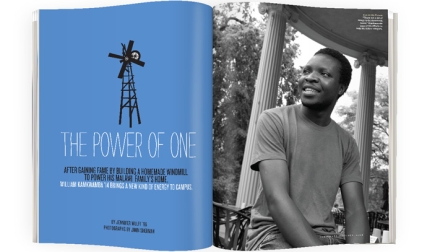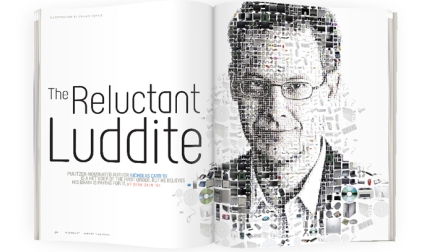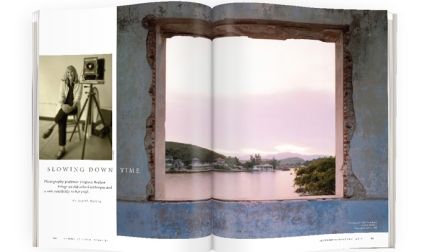The scouting report on Laurel Richie ’81 says she has no jump shot and questionable dribbling ability. In fact, she’s never played basketball. But if you look at her career resume you’ll see why her selection last spring as president of the Women’s National Basketball Association (WNBA) was a slam-dunk.
Richie stands only about 5-foot-4 (“I look up to WNBA players in every way,” she jokes), but she’s a business-minded power forward who’s got game. She knows all the inside moves of advertising and marketing and believes they’ll help the struggling women’s league become a major thread in the fabric of American sports.
Getting to know the league “has been great, very exciting, at moments overwhelming,” Richie says on a sunny day in her WNBA headquarters office overlooking New York City’s Fifth Avenue. It’s a rare summer day at her desk for the new league executive, who by mid-July had visited all 12 of the league’s teams and met with scores of owners, players and fans. “Everyone was incredibly welcoming,” she says. “There’s a lot to learn. This is a new industry for me, a new organization, but I am loving it. What amazes me about the players is not just their athleticism and commitment to their sport but also their commitment to the communities in which they play, the way they reach out to young girls and young boys. I am very proud and honored to be their leader.”
Coincidentally, Richie will deal in circumstances such as collective bar- gaining with fellow alum Pam Wheeler ’89, director of operations of the WNBA players association. “We’d never met but we’ve already had lunch and had a good time
comparing notes and reflecting on how amazing it is to be African-American females in our jobs,” Richie says. “Pam has always had a great relationship with the league, and I look forward to that continuing.”
The first African American to head a professional sports league, Richie is no stranger to challenges, which this job brings. Though it’s subsidized by the NBA—Richie reports to Adam Silver, the deputy commissioner/COO of the parent league and was introduced to the media by its commissioner, David Stern—“the W,” as Stern referred to it in that announcement, has battled hard during 15 seasons to remain viable. Last year, the average league game attracted about 7,800 fans, and only a handful of games air on television during the June to September WNBA season.
In Richie, Stern said, the WNBA has a president “with an extraordinary reputation in our league as a team builder.”
It’s now Richie’s responsibility to increase the league’s visibility, attendance and TV and media coverage, and to attract new sponsors: the kind of marketing she’s done previously. With established stars such as Sue Bird (the Seattle Storm guard who played at UConn), Candace Parker (the former Tennessee star now with the Los Angeles Sparks) and Maya Moore (this year’s top draft pick out of UConn who has transitioned seamlessly into professional play with the Minnesota Lynx), Richie is convinced new ticket buyers will be hooked.
“I believe fans—and the general public—will fall in love with players and will follow them even more so than teams,” she says. “I want people to get to know our players for who they are off the court as well as on. I think rivalries can be promoted not just between teams but also between cities and between individual players. In June I watched Candace Parker, who was the first rookie of the year ever to be MVP in the same year, playing against Maya Moore, and I couldn’t help but wonder what’s in store for Maya.”
Although Richie had yet to draft a detailed marketing strategy after only eight weeks on the job (she began May 17), she was eager to get back to her desk following her “team tour” and the July 23 All-Star game in San Antonio, Texas, to do just that. It’s clear, however, that promoting WNBA players as role models and exemplary citizens in a sports world hungry for both will be an important and distinguishing element.
“I view this job as an opportunity to help the league grow in popularity. I feel like everything I’ve done up until this point has been in some way preparing me for this,” says Richie. “I have marketed products and services for women and girls for a long time. This is a remarkable, impressive group of women. There’s an aspect of the WNBA that is absolutely critical: that we have professional women sports teams, and right now the WNBA is the only one that’s been around. So ensuring that we are here and thriving is critical.” Then there’s the bias against women athletes. “I’d like to create an environment similar to that in pro tennis. Men’s and women’s tennis are different, but one is not better than the other,” she says. “Both have great athletes competing.”
One thing that Richie has noticed in her travels that bears out the league’s research, she says, is that the WNBA “attracts people from every walk of life and a mix of families with kids as well as basketball fanatics attracted by the purity of the game.” That the league offers an affordable night out (the average ticket price is about $15) is something she thinks can distinguish the WNBA. “We’re making the game very accessible,” she says.
Richie’s road to the WNBA front office began in the Cleveland, Ohio, suburbs. Her dad, Winston, a Cavaliers season ticket holder for more than 30 years, was a dentist in Shaker Heights, where he and his wife, Beatrice, who earned a degree in library sciences and worked as a librarian, were active in community affairs.
Early on Laurel learned about racial discrimination. “I got a little bit of that trailblazing quality from my parents,” she says. “I love to tell people the story about when we moved into the house that I grew up in 1964 or 1965. [The owners] wouldn’t sell to my parents because they were black. So some friends of my parents bought the property, sold it to my parents at their cost, and we moved in.”
Richie followed her older brother, Winston ’77, to Hanover after considering her sister’s school, Cornell. “That drive over the Connecticut River, up the hill! I got to the Green and said, ‘This is what my vision about college is all about,’ ” she says.
Richie began her freshman year studying foreign languages, but she had changed her major by junior year. “The reason I chose policy studies was my interpretation of studying how people make decisions,” she says, “how our government makes decisions, how individuals make decisions, how we use technology to help us make decisions, how we use psychology to influence people. I think I have used those skills a lot in my career.”
Richie had never attended a WNBA game before taking her job, and she’s interested in studying the psychology of how someone becomes a season ticket holder: “I’ll be looking at how someone goes from being vaguely aware [of the league] to interested in attending a game, then making that first decision to purchase a single ticket ,then committing.”
Outside of class Richie performed in College productions of Working, Company and The Crucible. Dance was another passion. “Pepe and Vicki DeChiazza taught ballet and jazz classes in Webster Hall every night from 4 to 8 p.m.,” Richie recalls. “So that’s how I spent my time, going to school during the day, dancing at night and then heading to Sanborn to study.
“I think everything I’ve ever done as an extracurricular activity has informed my work,” she says. She can even see the parallel between acting and professional basketball. “Anytime you’re playing in front of thousands of fans you’re as much on stage as any actor,” she says. “You’re an athlete first, but you’re also trying to connect with your audience.”
Environmental studies classes with professor Jonathan Brownell were another aspect of her time at Dartmouth. “I remember him appreciating my inquisitiveness where other teachers and other people have found it to be tedious and overwhelming,” she says. “He said, ‘Stay that way. This is good, don’t change who you are, and persevere,’ and I’ve always held on to that.”
Facing graduation, Richie considered a variety of investment banks and nonprofits before taking a position with ad agency Leo Burnett in Chicago. “I decided to go into advertising because I was interviewed for Burnett by John Kovas ’63. At 40 he was the type of person I wanted to be: well read, up on current events, knowledgeable about music and the arts…just a really interesting sort of a man,” she says. She learned from him that to be successful in advertising it’s necessary to study popular culture to help brands stay relevant.
After completing Burnett’s management training program she moved to New York in 1983 and considered a return to her old love, theater. “Some of my friends from Dartmouth were actors, and I thought, ‘I should try this as well.’ I went to one open audition and I remember thinking, ‘This is me! This is my big break.’ I got there at 7 in the morning and there were 350 people already there, already lined up, beautiful women, and I just thought, ‘Oh no.’ I can’t remember the show. They had described my height and weight, but my skin was not thick enough. From there, I got back into the advertising business very happily.”
She started with Ogilvy & Mather in January 1984, and stayed with the firm for 24 years, working on everything from the AT&T merger to Huggies diapers for Kimberly-Clark. “Every time I started to get bored or a little complacent some new frontier would open up,” she says.
In 2008 Richie was ready for a new frontier. This time it was the Girl Scouts of America that tapped her as senior vice president. Identity and imagery, two objectives of her current job, became her main concerns. “I learned a lot about the importance of female role models with the Scouts,” she says, “and that’s something the WNBA offers as well. Who could offer a better example of an active, healthy lifestyle than a WNBA player?” Richie has been delighted to discover that the two organizations have already partnered in some of the league’s local markets. In July in Phoenix, Arizona, for example, Scouts attended a game and had a sleepover in the arena. Richie was a featured speaker.
Her gift with a microphone in hand is one of the talents that got her where she is now. In early 2011 Richie went to Seattle to deliver the keynote address at a Girl Scouts fundraiser, where the Seattle Storm was being honored for winning its second WNBA championship. Karen Bryant, the team’s president and CEO, heard Richie speak that day.
“Three-quarters of the way through her speech I made eye contact with [Ginny Gilder and Dawn Trudeau, two of the Seattle Storm owners],” Bryant recalls. “The WNBA was looking for a new president, and I loved hearing her story, all that she had accomplished. She was just the kind of person we were looking for.”
With Richie as that new president, Bryant says the WNBA is in good hands. “I think she brings a fresh perspective. She has new ideas to expand our audience. We have a great product, great players, and I’m sure she’ll take us to the next level.”
Ralph Wimbish, an assistant sports editor with The New York Post, is a frequent contributor to DAM.




